SSAWW Reads: Chats with Authors about Their New Books
On Friday, October 25 at 1:00 PM EDT, join Laura R. Fisher and Arielle Zibrak, in conversation with María Carla Sánchez, as they address these questions and discuss how their new books engage with the complex relationship between literature’s social aims and its aesthetic value. This event, which is hosted by the Society for the Study of American Women Writers (SSAWW), is part of the series SSAWW Reads: Chats with Authors about Their New Books.



